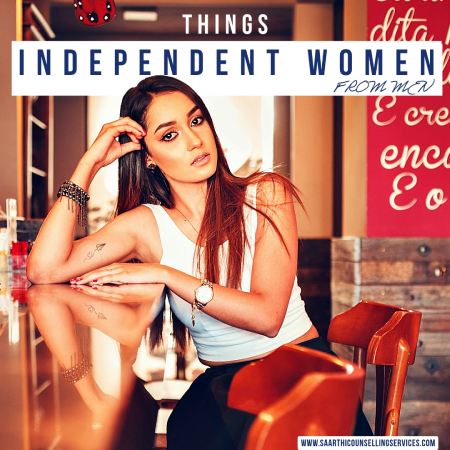Dating an independent woman can be an enriching experience, but it also comes with its own set of nuances. So, what exactly do independent women want from men in relationships?
First and foremost, it’s essential to understand who an independent woman is. She’s not just someone who pays her bills or pursues her career goals. An independent woman knows herself deeply, speaks her mind with clarity, and lives authentically according to her values. She doesn’t seek validation or fulfilment from others; instead, she finds it within herself.

What are the things independent women want from men?
Let us learn from leading marriage and relationship counsellor Shivani Misri Sadhoo in this blog.
Respect
Independent women seek partners who not only recognize but celebrate their autonomy. A secure man values her self-reliance, encouraging her aspirations and respecting her need for space. He engages in constructive dialogue, cherishes her uniqueness, and supports her goals.
Moreover, he values her physical boundaries and emotional well-being, recognizing that true allure lies in his ability to comprehend and connect with her as an individual while acknowledging the unity within their shared journey.
Equality in relationships
An independent woman looks for a partner who is her equal, not her competitor. She believes in sharing responsibilities, making decisions together, and working as a team to build a life. This means both partners pitch in and share the load, creating a balanced and satisfying dynamic.
Equality isn’t just about the basics; it’s about fairness, talking openly, and understanding each other. It’s about seeing and respecting each other’s differences and treating each other’s opinions and contributions with value, regardless of what society says.
Honest communication
Good communication is vital for a healthy relationship. Independent women appreciate partners who are upfront and willing to have deep conversations. She values openness and honesty, so it’s important to be direct and assertive like her.
Don’t shy away from expressing your thoughts and feelings. She wants her partner to be transparent and vulnerable too, as this builds intimacy and strengthens the relationship. So, keep the dialogue open and honest for a deeper connection that grows stronger over time.
Emotional connection
Sometimes, grasping the unspoken nuances becomes crucial. An empowered and self-reliant woman places great value on emotional availability in a relationship. Recognizing the significance of emotional intimacy, she seeks a connection that goes beyond shared interests and physical attraction. Fearless in embracing vulnerability, she desires a partner who shares this openness.
For her, a relationship is a comprehensive bond that involves mutual support and understanding. Even the most self-sufficient woman may, at times, yearn to be vulnerable, allowing her partner to be the pillar of strength.
They want their partners to follow their own dreams too
Independent women seek partners who are strong and self-sufficient. They are drawn to individuals who can handle their own lives without constant support. These women value ambition and expect their partners to have their own aspirations.
Being with someone who is driven not only adds excitement to the relationship but also fosters personal growth and independence. Such partnerships propel both parties toward their dreams and create a supportive environment for mutual success.
Looks for unconditional love
An independent woman values her needs in a relationship. Despite her strength, she desires love, care, and consideration. Like anyone, she seeks a partner who embraces her flaws, celebrates her uniqueness, and stands by her through life’s challenges. Recognize her feelings, be there for her, and show unconditional love for a flourishing relationship.
Now that we’ve explored what independent women expect from their partners—respect, equality, honest communication, emotional connection, and shared dreams—it’s evident that they seek relationships built on mutual understanding and support. These expectations foster strong bonds where both individuals thrive personally and collectively, embracing each other’s autonomy and aspirations.
